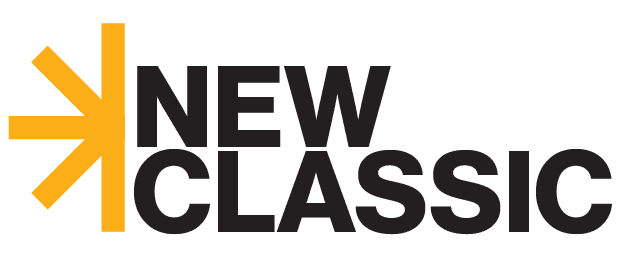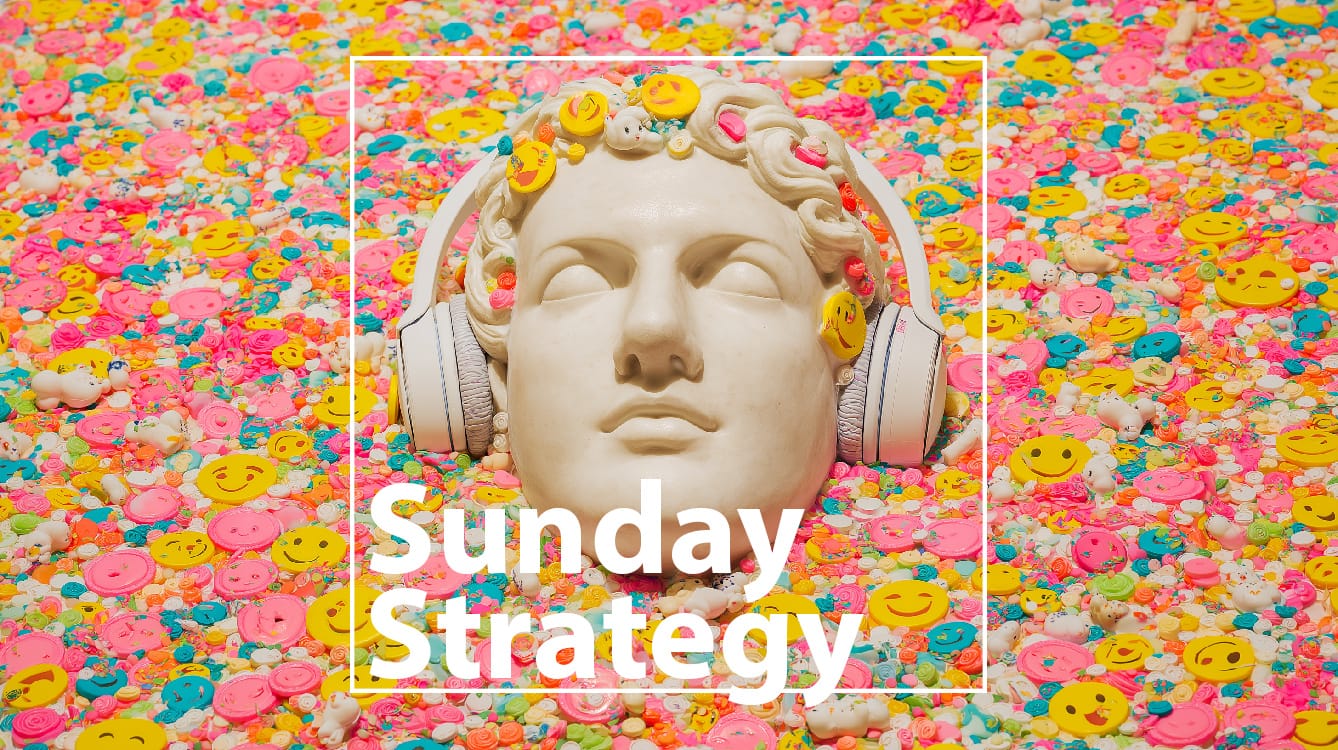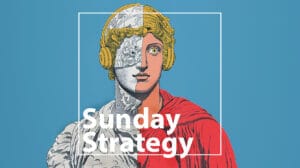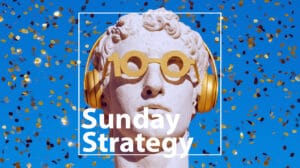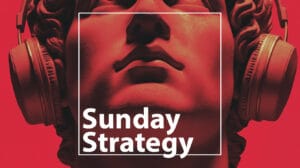In this issue of Sunday Strategy, we look at four stories to think about next week, including: The Drowning Internet, Digital Disk Dark Ages, When Everything Became Intentional, Weird Halloween Candy, Retirement Roommates and the importance of ‘High Quality’ Jobs.
In addition, we have ads from: McDonalds Japan, AG1, Paddy Power, The Ordinary and Gushers.
// Stories of the Week:
1.) Is the Internet Drowning in Content?
While apocalyptic scenarios normally focus on destructive forces, there has always been an alternative risk in unchecked creation. The ‘Grey Goo’ scenario theorized that the world could end through unchecked nanobot creation – relentlessly replicating until all resources were exhausted and life was extinguished. While this luckily hasn’t come to pass in our wider world, a similar scenario may be more probable online.
A new study from SEO firm Graphite theorizes that nearly 50% of online content, sampled from 65k English language pages, is AI generated vs. human generated. While human content (52%) is still more numerous than AI content (48%), the pace at which near parity has been achieved doesn’t bode well for a human centric internet of content (growing from less than 20% at the end of 2022). Despite cases where AI growth is ‘slowing down’, from vibe coding to enterprise use, content creation is something the technology is rapidly expanding and refining – with new models and the recent launch of Sora 2.
While the numbers may not be exact, due to sampling scale limitations, the overall direction of internet content is clear. While worries about AI’s destructive capabilities in the wider world are an open question, its capacity to destroy the internet as we know it is here. The ‘Dead Internet Theory’ has always conspiratorially proposed that most traffic and engagement is automated, propping up a smaller, mostly artificial online ecosystem. AI content, if left unchecked in growth and quality, looks to swap a ‘dead internet’ with a ‘drowned one’. A world where every potential piece of content that could be created is; consumes our attention in a similar way that ‘Grey Goo’ could in the real world – submerging the online ecosystem and rendering the attention atmosphere barren.
2.) The Race to Rescue Knowledge From Disks.
The time may have already come that a generation of users can’t recognize a disk or understand why the ‘save icon’ looks like it does. However, this doesn’t negate a growing crisis in digital storage and archives, where unique data stored on floppy and hard disks is at risk of being lost to those hoping to preserve them. Disks aren’t as secure as we would assume, as plastic degrades and magnetic platters collect damage or mold, and we need increasingly specialized hardware to access the data within, unlike printed or written information.
The challenges to access and preserve data on disks becomes real when we think about the work captured on them in the 80s and 90s. Cambridge University recently received a cache of materials from the estate of physicist Steven Hawking, which as an early adopter of the personal computer included numerous floppy disks. The race to access, transfer and preserve potential notes and insight from the physicist underscores a challenge more and more organizations will face in the coming years. When more of our knowledge is stored in the cloud, what’s left on the ground becomes increasingly important to find.
3.) When Did Everything in Life Become ‘Intentional’?
Why has ‘intention’ become such a buzz word in social media and advertising? From intentional dating, living, socializing and reading through to brands like Rhode (‘intentional skin care and beauty essentials’) – an uncertain world has seemingly resulted in a greater focus on control through intention. Modern ‘intentionality’ combines presence and self-awareness in a way that tries to find control that pushes against the urge to live life on autopilot.
However, when we try to assign a greater meaning and structure to our daily lives, do we lose a sense of spontaneity? When everything is intentional, do we have the energy to find what’s truly important in our lives – or are we poised to swing back culturally towards a celebration of the mindless and mundane?
4.) Something Weird is Going on With Chocolate Halloween Candy.
With Halloween nearly upon us, you might be surprised with the candy you see in store aisles or in Trick or Treat baskets this year. While 4 in 5 consumers Halloween candy shoppers still reportedly plan to buy chocolate, various forces have combined to push products away from traditionally chocolate offerings. Higher cocoa bean prices, a focus on new textures and tastes like fruit flavours and nostalgia have all expanded candy brand’s focus beyond chocolate. With long term growth of ‘gummy candy’ growing 4.9% in 2024 (highest of all subcategories) and brands like NERDS clusters continuously pushing new combinations of flavours and textures, we may be seeing a time where the humble chocolate Halloween candy struggles to compete.
5.) The Rise of Retirement Roommates
According to AARP, 75% of those over 50 want to remain in their homes as they age – but will the economy and costs agree? Amongst rising housing costs and healthcare concerns, the need to stay at home is making many older Americans reconsider how they live in that home. Alternative living arrangements involving non-family members are emerging as a way to keep homes secure. 990k older adults lived with unrelated housemates or roommates in 2023, up 8% since 2021 and the AARP says those who are sharing have found benefits from shared help, extra income and companionship.
While multi-generational households are also on the rise in response to economic and housing concerns, the increasing openness to inviting wider individuals to live with us in older age looks to change how we view home ownership, retirement and even how we view our later years overall.
// Chart of the Week: Do You Have a ‘High Quality Job’?
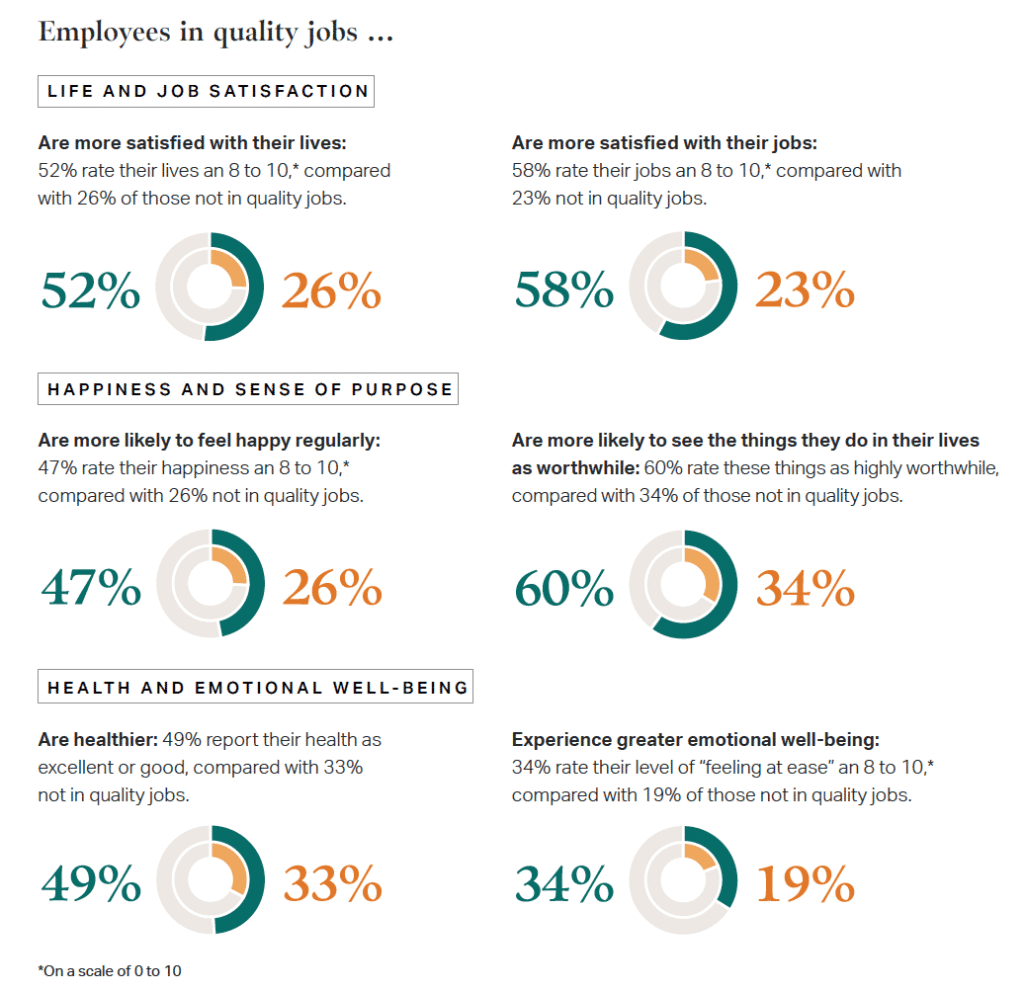

Gallup’s new ‘American Job Quality Study’ provides more detail on the state of workers in the US today. Amongst its findings, it highlights that only 40% of workers hold ‘quality jobs’ – defined as those that offer fair pay and benefits, safe and respectful workplaces, opportunities for growth, a voice in decisions and sustainable schedules.
While current economic uncertainty may force us to think more about having ‘any job’ vs. a ‘quality job’, job quality was found (as shown above) to impact happiness, purpose, health, emotional well being and job satisfaction. The research shows the need, even in a tough market, to find a way to offer a greater employment experience.
// Ads You Might Have Missed:
1.) ‘Street Burgers’ – McDonalds Japan:
We can’t really say 90s nostalgia has peaked until someone takes on the bedrock of many 90s childhoods – Street Fighter 2. Luckily, McDonald’s Japan has created a pixel perfect recreation of the game, complete with fast food themed special attacks, in three ads promoting their ‘Street Burgers’ products in partnership with Capcom.
From Ken and Ryu to Chun-Li, the pixelated homage taps into a gaming icon that’s potentially only matched by whomever decides to tackle ‘Goldeneye Multiplayer’. While McDonalds doesn’t integrate its characters as deeply as KFC did, when the Colonel became a character – this partnership takes snippets of 90s gaming heritages and brings them into 2025 in mint condition.
2.) ‘Fruit Head’ – Gushers:
The branded horror film is having a golden age this Halloween, with brands from Six Flags to Hatch creating horror shorts with well known tropes and recognizable actors. American candy brand Gushers takes it a step further with their short film, ‘Fruit Head’, touching on 90s nostalgia, their advertising heritage, the occult and a bit of Texas Chainsaw Massacre.
Fruit Head sees the West Wing’s Bradley Whitford as a director, making sinister choices while creating Gusher’s classic 90s ads. Using the occult instead of CGI, the ‘fruit head’ character featured in the 90s ad has all grown up and wants revenge. The short does more than try to scare, it makes a pithy attempt to talk about children’s advertising tropes, which like the main character – haven’t aged as well as hoped.
While recontextualizing old ads may normally only scare the marketers behind them, ‘Fruit Head’ shows how brand heritage can be played with to create a greater range of emotions from consumers.
3.) ‘The Periodic Fable’ – The Ordinary:
The Ordinary’s latest campaign takes aim at the language the beauty category has created to sell itself. ‘The Periodic Fable’. Using a periodic table as a visual mechanism, and featuring a hero film where students are taught these terms in a dystopian classroom – users are driven to visit the website to learn more about the ‘fables’ behind each term.
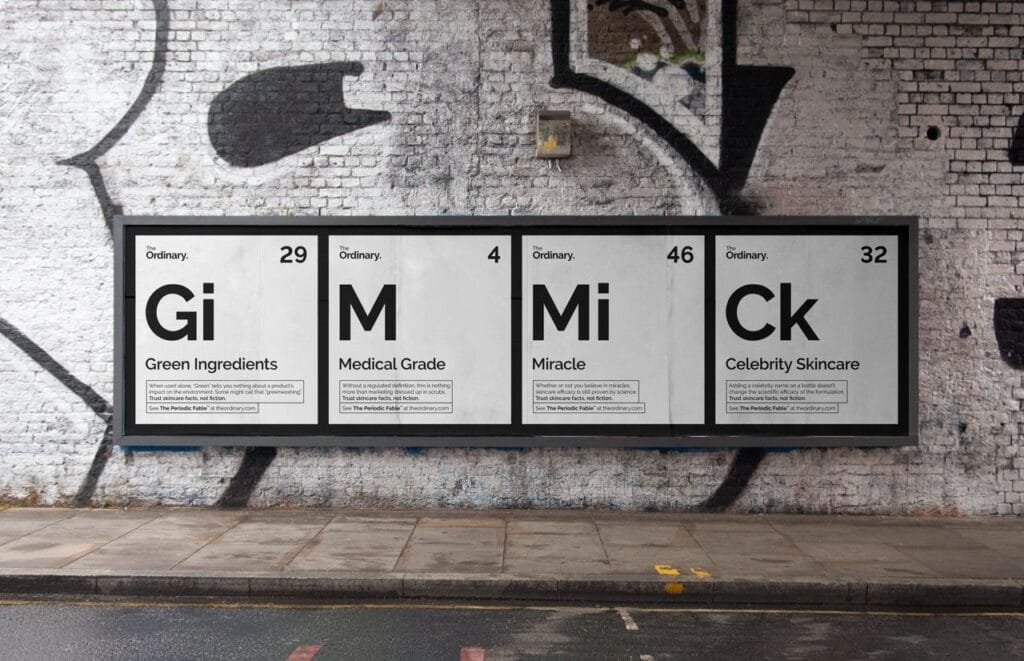

Though many ethical beauty brands have attempted to change the category, the Ordinary’s move takes a more aggressive stance to deconstructing the marketing machine and norms behind beauty – showing that doing good isn’t enough, you have to try and correct the bad.
4.) ‘Paddy Power Games’ – Paddy Power:
Danny Dyer is many things: British actor, Eastender, descendent of royalty and now, casino owner. In a new ad from betting brand Paddy Power, featuring cameos from everyone from Peter Crouch to Colleen Rooney, Dyer runs a version of a casino that’s more camp than Casino Royale. Set to the backing beat of Bloodhound Gang and featuring a range of audiences from pilates groups to finance bros in quarter zips, the ad doesn’t take itself too seriously – while still avoiding becoming ‘Foxy Bingo’.
For a brand known for their ‘cheeky’ approach to betting and gaming, the ad does cultural relevance and humor while still fitting in cues to the types of gaming on offer. Dyer and his moustache simultaneously make a strong case for a UK remake of the long running American series, ‘Las Vegas’.
5.) ‘Nutrition in Labs’ – AG1:
Nutrition brand AG1 has taken a new approach to college athletics’ NIL (Name, Image and Likeness) shifting the focus from student athletes to student scientists. ‘Nutrition in Labs’ sees the brand sign endorsements with three ‘rising researchers’ working on topics ranging from: sleep’s impact on health, nutrition gaps in female athletes and how diet and the microbiome shape health.
The campaign does more than make a pithy pun on NIL and sponsorship, it reinforces the brand’s dedication to science and research. In a sector where supplements are often challenged about their ingredients and quality, trust is an issue. Simply saying you believe in research isn’t often enough, so innovative ways to show a belief in research like this are increasingly valuable.
// Sunday Snippets
// Marketing & Advertising //
– Japan’s number 1 beer, Asahi, rolls out a new global brand platform ‘Seek What is Unique’ [Brands]
– Heineken taps into furor around AI device ‘Friend’ ads, with a tactical ad celebrating beers with real friends [AI]
– Chemistry and Georgia CORE partner to bring ‘weird looking stools’ into the bar – to raise colon cancer awareness [Ads]
– Ford introduces the ‘truckle’, a belt buckle able to hold keys so your belt buckle… can start your truck [Auto]
– Vogue Business’ research shows that size and fit are as powerful deterrents to purchase as price and quality for many consumers [Fashion]
– Storychief rounds up 26 recent innovative campaigns [Lists]
– Convenience Store brand H-E-B launches its annual San Antonio Spurs ad as the NBA kicks off [Ads]
– How did US donut brand Krispy Kreme lose $441m last quarter? [Food]
– ALDI launches a jacket potato… jacket [Fashion]
– Kahlua and Dunkin’ have partnered on a new product and a new term, ‘Kahlunkin’ [Brands]
– Building on NYC’s great ‘lookalike contest’ craze of summer 2025, Clash of Clans is hosting a barbarian lookalike contest this weekend in Hudson Yards [Gaming]
– American Express says its new Platinum Card offering is a hit that even surpasses their expectations [Finance]
// Technology & Media //
– New research looks further at how the future of advertising may be, at least in part, agentic [AI]
– WPP and Google announce a new strategic partnership [Media]
– e.l.f. Is the first to launch shoppable Twitch ads [Media]
– Spotify rolls out ‘managed accounts’ for younger listeners, as well as leveling up its AI DJ to take Spanish language and text requests [Media]
– Russia’s new super app, Max, is being rolled out on every new phone in the country [Social Media]
– 1 in 5 US students report ‘being in a relationship with AI’ or ‘knowing someone who has’ [AI]
– Meta announces new measures to allow parents to block AI character interaction with under 18s [AI]
– Apple announces M5 chip, pushing ‘on device’ AI capabilities [Tech]
– Meta is bringing a paid, ad-free experience to the UK [Social Media]
– How are anti-depressants being reframed on TikTok? [Social Media]
– Are Claude’s new ‘Skills’ a bigger deal than MCPs? [AI]
– Uber offers drivers additional money for ‘data tasks’ that train AI [Work]
// Life & Culture //
– SKIMS launches and quickly sells out their “Ultimate Bush” panties [Fashion]
– Vogue reports a decline in ‘curve’ or ‘plus size’ models [Fashion]
– Target launches collaboration with Woolrich [Home]
– Maybe ‘6’ ‘7’ are just numbers kids yell [Culture]
– Showing an understanding of modern American football players’ NIL reality, Coach Deon Sanders holds a practice to help benched players get potential promotional footage for a transfer move [Sports]
– Is pen collecting catching on with a younger generation? [Culture]
– 49% of the British public reports being an ‘in-betweener’ (between ‘cool’ and ‘not cool’) when in school [Research]
– As less people drink, where does that leave the ‘art of having a hangover’ [Drinks]
– The US government shutdown has resulted in an increase of illegal BASE jumping in national parks [Sports]
– Breaking down London’s phone theft problem [Culture]
– A German museum finds itself dealing with an influx of Taylor Swift fans due to ‘The Fate of Ophelia’ [Arts]
// Until Next Sunday
As always, let me know what you think by email (dubose@newclassic.agency), website or on LinkedIn.
You can also listen to an audio summary and discussion of each week’s newsletter on Spotify. We’re also on TikTok!
